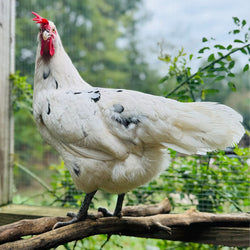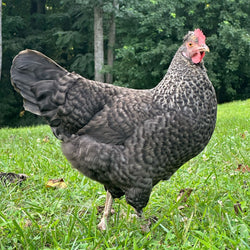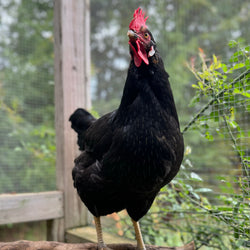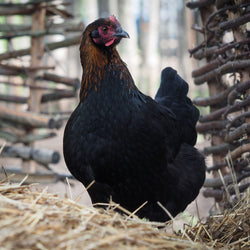f=menu&page=6/--
Frequently Asked Questions
Here we answer the most commonly-asked questions about ordering, chicken care, and more.
Should the chickens' feeders and waterers go inside the coop, or should they go outside in the run?
That's a good question! Chickens need to have access to their food and water at all times when they're awake. However, once they return to roost at night, they sleep soundly and won't get up to eat or drink. (The exception to this is if you have a broody hen; sometimes a broody will want to get up at night to eat and drink, rather than during the day.) But because your chickens won't, for the most part, be eating and drinking after dark, you can choose to have your food and water outdoors or in. It is done both...
Read MoreHow do I help a chick that isn't eating or drinking?
Well, first remember that if you hatched these babies at home, chicks don't actually need to eat or drink for the first two or three days... so the fact that your home-hatched chicks aren't eating or drinking immediately isn't always a cause for concern. Strange but true. Hatching is hard work, and with the yolk that they have just absorbed to sustain them, sometimes they just take time to rest and recover. That said, if you've had chicks shipped rather than hatching them at home---or if your home-hatched chicks are a couple days old or seem weak---they will definitely need...
Read MoreHow can I keep my brooder warm during a power outage so my baby chicks don't die?
Power loss can happen at any time due to storms, fallen trees, traffic accidents, construction, lightning, and more. A prolonged power outage can be a real problem if you have baby chicks or waterfowl in the brooder and are depending on an electric heater to keep them warm. You don't want anything to happen to your babies, so it's important to be prepared in case the power goes out on you. Here are some ideas to help keep your chicks safe in the event of a power outage: Hot Water Bottles - One of our customers from Vermont told us...
Read MoreHow can I stop my rooster from pecking my hens?
Unless your rooster is causing the hens injury, pecking hens on their backs and heads is actually no cause for concern. It is courting behavior. He pecks them on their backs or heads as a signal that he would like to mate. With enough hens for each rooster present--we normally recommend 10 - 12 hens to one rooster--you shouldn't have any trouble with his over-breeding the hens, although it's still possible he might develop a favorite or two. When a hen gets pecked like that, if she is ready to mate, she will squat down so she can be mounted....
Read MoreCan I give my chickens moldy bread, moldy leftovers or moldy feed?
No, your chickens should not eat anything with mold on it. Just as moldy or rotten food can make you sick, it can make them sick. Sharing some leftovers you don't want with your chickens is a good idea (in moderation). We often give our chickens leftovers there aren't enough of to bother keeping... but they must not be moldy or rotting . Stale bread can be okay, although it probably won't have it's full nutritional value... but mold? No. Certain types of mold can be quite dangerous. The same goes for their regular chicken feed: if you see mold,...
Read MoreShould I give my hens vegetarian feed?
Should I give my hens vegetarian feed? |You have probably seen labels on grocery store eggs claiming they have been laid by "vegetarian-fed hens," so is this something you should be looking for with regard to your own hens' feed? Well... yes. And no. Sort of. But not really. Got it? No? Well, let me explain. NO, you don't want to restrict your chickens to vegetarian food in that chickens are omnivores. They eat mice, frogs, snakes, lizards, grasshoppers... basically any creature small enough to swallow, and occasionally some creatures just small enough to kill and eat in pieces, like...
Read MoreWhat is an apron fence, and why is it helpful?
An apron fence is a fence that helps to keep out digging predators. But it isn't normally a special type of fence that you buy; it's more of a special way to install your fence. You can install a dug apron fence or a bent apron fence. For a dug apron fence, you might bury a foot or so of your fence in the ground... so if you buy a six foot fence, one foot of it would be buried, and the fence would be five feet high. When a predator like a rodent, dog, or fox tries to dig...
Read MoreHow do I keep my run from becoming muddy?
Depending on where you are in the country and how your coop is sited, you may occasionally have problems with mud in the run. There are worse things than a little mud from time to time, but if your chickens have no place to escape a mucky run, that means they are pooping in the mud, walking in the muddy poop, foraging in muddy, poopy soup... so ick. That is a formula for illness, and that fertile muck is a perfect place for bad things to grow: coccidia, worms---and worse. They definitely prefer a green pasture to a mud pit....
Read More







"The Clubhouse" Coop
Easy to assemble and built to last, the Clubhouse Coop is the perfect starter coop for a small flock.











